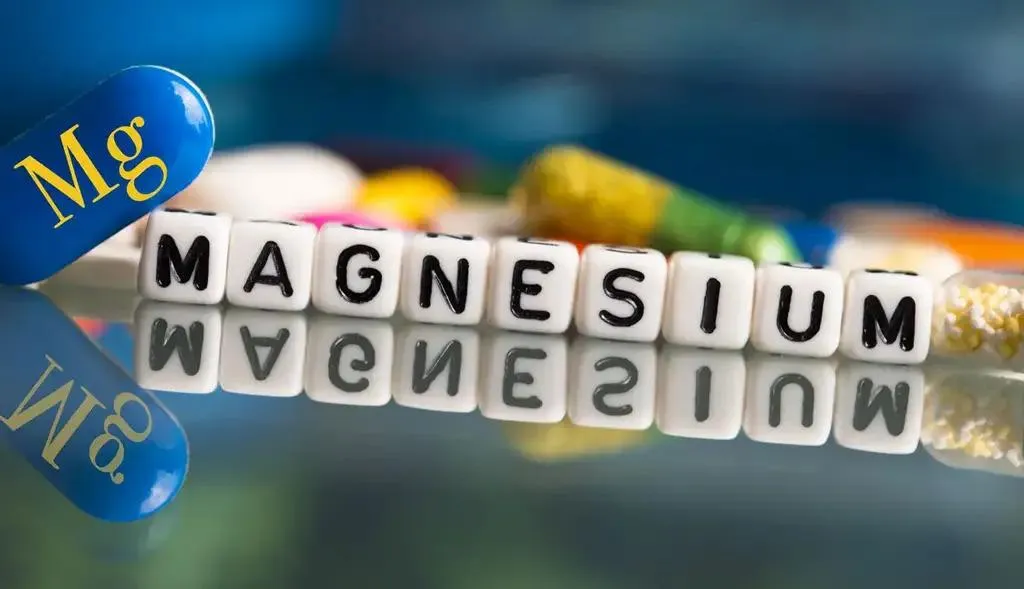THE HOTTEST WELLNESS CONTENT ON THE INTERNET
Click to select an article

Different Types of Magnesium: A Comprehensive Guide
Magnesium is an essential mineral that plays a crucial role in various physiological processes in the human body. It is involved in over 300 enzymatic reactions and is necessary for the proper functioning of the nerves, muscles, and bones. Magnesium also helps regulate blood pressure, maintain heart health, and support the immune system.
There are several different types of magnesium supplements available on the market, each with its own unique set of benefits. Some of the most common types of magnesium supplements include magnesium citrate, magnesium glycinate, magnesium oxide, magnesium chloride, and magnesium malate. Each of these types of magnesium supplements has a different level of absorption and bioavailability, which can impact their effectiveness in addressing specific health concerns.
Understanding the different types of magnesium supplements available can be overwhelming, but it is important to choose the right type of magnesium supplement for your individual needs. In this article, we will explore the various types of magnesium supplements available and their benefits, helping you make an informed decision about which type of magnesium supplement is right for you.
Types of Magnesium Supplements
Magnesium is an essential mineral that is important for various bodily functions. However, many people do not get enough magnesium through their diet alone. That is why magnesium supplements are becoming increasingly popular. Here are some of the most common types of magnesium supplements available:
Magnesium Citrate
Magnesium citrate is a popular form of magnesium supplement that is highly bioavailable. It is often used to support digestive health and relieve constipation. Magnesium citrate is also thought to help improve sleep quality and reduce anxiety.
Magnesium Glycinate
Magnesium glycinate is a form of magnesium that is bound to glycine, an amino acid. This form of magnesium is highly bioavailable and is often used to support relaxation and promote better sleep. Magnesium glycinate may also help reduce symptoms of anxiety and depression.
Magnesium Chloride
Magnesium chloride is a form of magnesium that is often used topically. It is commonly used in bath salts and foot soaks to help promote relaxation and reduce muscle soreness. Magnesium chloride may also help improve skin health and reduce inflammation.
Magnesium Oxide
Magnesium oxide is a form of magnesium that is less bioavailable than other forms of magnesium. However, it is often used in supplements because it is inexpensive. Magnesium oxide may help support bone health and reduce symptoms of acid reflux.
Magnesium Malate
Magnesium malate is a form of magnesium that is bound to malic acid. This form of magnesium is thought to help improve energy levels and reduce muscle pain and fatigue. Magnesium malate may also help support cardiovascular health.
Magnesium L-Threonate
Magnesium L-threonate is a form of magnesium that is highly bioavailable and is thought to be particularly effective at crossing the blood-brain barrier. This form of magnesium is often used to support cognitive function and improve memory.
Magnesium Taurate
Magnesium taurate is a form of magnesium that is bound to taurine, an amino acid. This form of magnesium is often used to support cardiovascular health and reduce symptoms of hypertension. Magnesium taurate may also help improve sleep quality.
Magnesium Orotate
Magnesium orotate is a form of magnesium that is bound to orotic acid. This form of magnesium is often used to support cardiovascular health and improve exercise performance. Magnesium orotate may also help reduce symptoms of anxiety and depression.
Magnesium Bisglycinate
Magnesium bisglycinate is a form of magnesium that is highly bioavailable. It is often used to support relaxation and promote better sleep. Magnesium bisglycinate may also help reduce symptoms of anxiety and depression.
In conclusion, there are many different types of magnesium supplements available, each with its own unique benefits. It is important to choose the right type of magnesium supplement based on your individual needs and preferences. If you are unsure which type of magnesium supplement is right for you, it is always best to consult with a healthcare professional.
Natural Sources of Magnesium
Magnesium is an essential mineral that is important for many bodily functions. It is involved in over 300 enzymatic reactions and is necessary for muscle function, blood pressure regulation, and heart health. There are many natural sources of magnesium, including food and supplements.
Food Sources
One of the best ways to get magnesium is through food. Some of the best food sources of magnesium include:
Spinach: A cup of cooked spinach contains 157mg of magnesium, which is 39% of the recommended daily amount.
Pumpkin seeds: A quarter cup of pumpkin seeds contains 190mg of magnesium, which is 48% of the recommended daily amount.
Whole grains: Whole grains such as brown rice, quinoa, and oats are good sources of magnesium. A cup of cooked brown rice contains 84mg of magnesium, which is 21% of the recommended daily amount.
Cashews: A quarter cup of cashews contains 89mg of magnesium, which is 22% of the recommended daily amount.
Almonds: A quarter cup of almonds contains 97mg of magnesium, which is 24% of the recommended daily amount.
Avocado: One medium-sized avocado contains 58mg of magnesium, which is 15% of the recommended daily amount.
Black beans: Half a cup of cooked black beans contains 60mg of magnesium, which is 15% of the recommended daily amount.
Edamame: Half a cup of cooked edamame contains 50mg of magnesium, which is 13% of the recommended daily amount.
Dark chocolate: One ounce of dark chocolate (70-85% cocoa) contains 64mg of magnesium, which is 16% of the recommended daily amount.
Salmon: A 3-ounce serving of salmon contains 26mg of magnesium, which is 6% of the recommended daily amount.
Supplements
In addition to food, magnesium supplements are also available. Some of the most common types of magnesium supplements include:
Magnesium oxide: This is the most common form of magnesium supplement. It is inexpensive and has a laxative effect, which can help with constipation.
Magnesium citrate: This form of magnesium is bound with citric acid and is easily absorbed by the body. It is often used to help with indigestion and heartburn.
Magnesium glycinate: This form of magnesium is bound with glycine, an amino acid. It is easily absorbed by the body and is often used to help with muscle relaxation and sore muscles.
Magnesium malate: This form of magnesium is bound with malic acid, which is involved in the production of energy in the body. It is often used to help with muscle weakness and fatigue.
Magnesium taurate: This form of magnesium is bound with taurine, an amino acid. It is often used to help with heart health and blood pressure regulation.
It is important to note that while magnesium supplements can be helpful for some people, it is generally best to get magnesium from food whenever possible. Magnesium supplements can interact with certain medications and can cause side effects such as diarrhea, nausea, and stomach cramps. It is always best to talk to a healthcare provider before starting any new supplement regimen.
Benefits of Magnesium Supplements
Magnesium is an essential mineral that plays a crucial role in many bodily functions, including nerve and muscle function, protein production, and blood sugar control. Magnesium supplements are available in different forms, and each type has its unique benefits and absorption rate.
Improved Sleep
Magnesium supplements can help improve sleep quality by promoting relaxation and reducing stress levels. Magnesium glycinate, magnesium citrate, and magnesium oxide are some of the best forms of magnesium for sleep support.
Energy Production
Magnesium is essential for energy production, and a deficiency can lead to fatigue and weakness. Magnesium malate and magnesium taurate are two forms of magnesium that can help increase energy levels.
Anxiety
Magnesium supplements can help reduce anxiety symptoms by promoting relaxation and reducing stress levels. Magnesium glycinate and magnesium threonate are two forms of magnesium that can help improve anxiety symptoms.
Migraine
Magnesium supplements can help reduce the frequency and severity of migraines. Magnesium oxide and magnesium citrate are two forms of magnesium that can help prevent migraines.
Stress
Magnesium supplements can help reduce stress levels and promote relaxation. Magnesium glycinate and magnesium taurate are two forms of magnesium that can help reduce stress levels.
Constipation
Magnesium supplements can help relieve constipation by promoting bowel movements. Magnesium citrate and magnesium oxide are two forms of magnesium that can help relieve constipation.
Blood Sugar Control
Magnesium supplements can help improve blood sugar control by increasing insulin sensitivity. Magnesium chloride and magnesium glycinate are two forms of magnesium that can help improve blood sugar control.
Bone Health
Magnesium supplements can help improve bone health by increasing bone density and reducing the risk of osteoporosis. Magnesium citrate and magnesium carbonate are two forms of magnesium that can help improve bone health.
Inflammation
Magnesium supplements can help reduce inflammation levels in the body. Magnesium chloride and magnesium glycinate are two forms of magnesium that can help reduce inflammation levels.
Fatigue
Magnesium supplements can help reduce fatigue levels by increasing energy production. Magnesium malate and magnesium taurate are two forms of magnesium that can help reduce fatigue levels.
Nerve Function
Magnesium supplements can help improve nerve function by promoting healthy nerve transmission. Magnesium glycinate and magnesium threonate are two forms of magnesium that can help improve nerve function.
Protein Production
Magnesium supplements can help improve protein production by promoting healthy muscle function. Magnesium malate and magnesium taurate are two forms of magnesium that can help improve protein production.
Heart Health
Magnesium supplements can help improve heart health by reducing blood pressure and promoting healthy heart function. Magnesium taurate and magnesium orotate are two forms of magnesium that can help improve heart health.
Magnesium and Vitamin D
Magnesium supplements can help improve vitamin D absorption and utilization in the body. Magnesium citrate and magnesium chloride are two forms of magnesium that can help improve vitamin D absorption.
Overall, magnesium supplements are safe and effective when taken as directed. However, it's essential to talk to a healthcare provider before starting any new supplement regimen to ensure safety and efficacy.
Shopping for sea moss, magnesium glycinate, and other popular supplements?
Click SHOP NOW below to see the best rated products in the market, by OrganicsOcean.com

Featured Article
Who makes the best sea moss product of 2024?
Our researchers compiled months of research so you know what mistakes to avoid when choosing a sea moss product. Click below to read now.
Frequently Asked Questions

Who writes your content?
Our content is written by supplement researchers and nutritional experts using AI models.
Are your articles sponsored?
Most of our articles are written without promotion or advertising intent. However, our top5 supplement reviews are paid for through commissions received from the listed products.
Can I advertise with you?
If you want to advertise your brand, please contact
info@rainmedia.co
© Copyright 2026 Top5-Choices.com by Rain Media. All rights reserved.
This website is owned and operated by the Organics Ocean brand, under Rain Media.
This site and its products and services are not associated or affiliated with, nor endorsed by YouTube, Google, or related entities. They have not been reviewed or backed by YouTube or its affiliates. Causes of ailment or condition vary amongst individuals. It is important that each visitor perform due diligence before purchasing anything recommended by this site, and verify with the manufacturer any claim about the products or services they provide. Results mentioned in testimonials and references are real, but not typical. They are to be used as examples only. This site may contain affiliate links or other forms of compensation. [1] We have a financial relationship with some of our top picks and own the Organics Ocean brand.
*These statements have not been evaluated by the FDA Food & Drug Administration. These products are not intended to diagnose, treat, cure, or prevent any disease.

